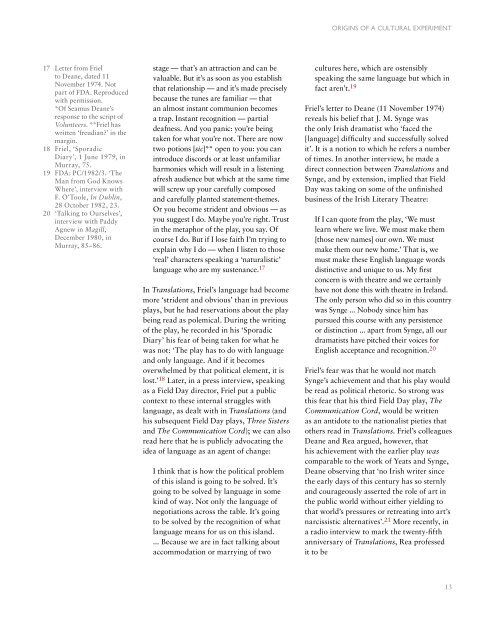cd on translations
cd on translations
cd on translations
You also want an ePaper? Increase the reach of your titles
YUMPU automatically turns print PDFs into web optimized ePapers that Google loves.
17 Letter from Friel<br />
to Deane, dated 11<br />
November 1974. Not<br />
part of FDA. Reproduced<br />
with permissi<strong>on</strong>.<br />
*Of Seamus Deane’s<br />
resp<strong>on</strong>se to the script of<br />
Volunteers. **Friel has<br />
written ‘freudian?’ in the<br />
margin.<br />
18 Friel, ‘Sporadic<br />
Diary’, 1 June 1979, in<br />
Murray, 75.<br />
19 FDA: PC/1982/3. ‘The<br />
Man from God Knows<br />
Where’, interview with<br />
F. O’Toole, In Dublin,<br />
28 October 1982, 23.<br />
20 ‘Talking to Ourselves’,<br />
interview with Paddy<br />
Agnew in Magill,<br />
December 1980, in<br />
Murray, 85–86.<br />
stage — that’s an attracti<strong>on</strong> and can be<br />
valuable. But it’s as so<strong>on</strong> as you establish<br />
that relati<strong>on</strong>ship — and it’s made precisely<br />
because the tunes are familiar — that<br />
an almost instant communi<strong>on</strong> becomes<br />
a trap. Instant recogniti<strong>on</strong> — partial<br />
deafness. And you panic: you’re being<br />
taken for what you’re not. There are now<br />
two poti<strong>on</strong>s [sic]** open to you: you can<br />
introduce discords or at least unfamiliar<br />
harm<strong>on</strong>ies which will result in a listening<br />
afresh audience but which at the same time<br />
will screw up your carefully composed<br />
and carefully planted statement-themes.<br />
Or you become strident and obvious — as<br />
you suggest I do. Maybe you’re right. Trust<br />
in the metaphor of the play, you say. Of<br />
course I do. But if I lose faith I’m trying to<br />
explain why I do — when I listen to those<br />
‘real’ characters speaking a ‘naturalistic’<br />
language who are my sustenance. 17<br />
In Translati<strong>on</strong>s, Friel’s language had become<br />
more ‘strident and obvious’ than in previous<br />
plays, but he had reservati<strong>on</strong>s about the play<br />
being read as polemical. During the writing<br />
of the play, he recorded in his ‘Sporadic<br />
Diary’ his fear of being taken for what he<br />
was not: ‘The play has to do with language<br />
and <strong>on</strong>ly language. And if it becomes<br />
overwhelmed by that political element, it is<br />
lost.’ 18 Later, in a press interview, speaking<br />
as a Field Day director, Friel put a public<br />
c<strong>on</strong>text to these internal struggles with<br />
language, as dealt with in Translati<strong>on</strong>s (and<br />
his subsequent Field Day plays, Three Sisters<br />
and The Communicati<strong>on</strong> Cord); we can also<br />
read here that he is publicly advocating the<br />
idea of language as an agent of change:<br />
I think that is how the political problem<br />
of this island is going to be solved. It’s<br />
going to be solved by language in some<br />
kind of way. Not <strong>on</strong>ly the language of<br />
negotiati<strong>on</strong>s across the table. It’s going<br />
to be solved by the recogniti<strong>on</strong> of what<br />
language means for us <strong>on</strong> this island.<br />
... Because we are in fact talking about<br />
accommodati<strong>on</strong> or marrying of two<br />
ORIGINS OF A CULTURAL EXPERIMENT<br />
cultures here, which are ostensibly<br />
speaking the same language but which in<br />
fact aren’t. 19<br />
Friel’s letter to Deane (11 November 1974)<br />
reveals his belief that J. M. Synge was<br />
the <strong>on</strong>ly Irish dramatist who ‘faced the<br />
[language] difficulty and successfully solved<br />
it’. It is a noti<strong>on</strong> to which he refers a number<br />
of times. In another interview, he made a<br />
direct c<strong>on</strong>necti<strong>on</strong> between Translati<strong>on</strong>s and<br />
Synge, and by extensi<strong>on</strong>, implied that Field<br />
Day was taking <strong>on</strong> some of the unfinished<br />
business of the Irish Literary Theatre:<br />
If I can quote from the play, ‘We must<br />
learn where we live. We must make them<br />
[those new names] our own. We must<br />
make them our new home.’ That is, we<br />
must make these English language words<br />
distinctive and unique to us. My first<br />
c<strong>on</strong>cern is with theatre and we certainly<br />
have not d<strong>on</strong>e this with theatre in Ireland.<br />
The <strong>on</strong>ly pers<strong>on</strong> who did so in this country<br />
was Synge ... Nobody since him has<br />
pursued this course with any persistence<br />
or distincti<strong>on</strong> ... apart from Synge, all our<br />
dramatists have pitched their voices for<br />
English acceptance and recogniti<strong>on</strong>. 20<br />
Friel’s fear was that he would not match<br />
Synge’s achievement and that his play would<br />
be read as political rhetoric. So str<strong>on</strong>g was<br />
this fear that his third Field Day play, The<br />
Communicati<strong>on</strong> Cord, would be written<br />
as an antidote to the nati<strong>on</strong>alist pieties that<br />
others read in Translati<strong>on</strong>s. Friel’s colleagues<br />
Deane and Rea argued, however, that<br />
his achievement with the earlier play was<br />
comparable to the work of Yeats and Synge,<br />
Deane observing that ‘no Irish writer since<br />
the early days of this century has so sternly<br />
and courageously asserted the role of art in<br />
the public world without either yielding to<br />
that world’s pressures or retreating into art’s<br />
narcissistic alternatives’. 21 More recently, in<br />
a radio interview to mark the twenty-fifth<br />
anniversary of Translati<strong>on</strong>s, Rea professed<br />
it to be<br />
13


